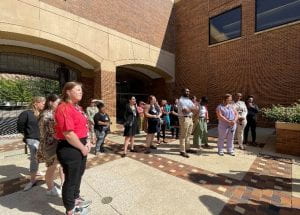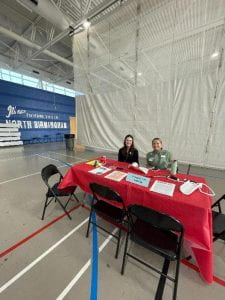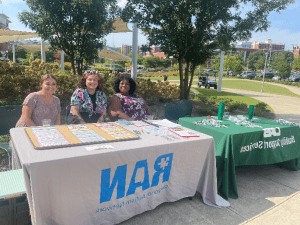Phillip Crain, MPA has joined the CEDD as our first Self-Advocacy faculty member for the UCEDD and LEND at UAB. He is also the Project Manager for Achieving Health Equity for Alabamians with Disabilities (AHEAD), a collaboration between the UCEDD and the Alabama Council for Developmental Disabilities. Phillip recently shared the following information about himself with the CEDD faculty, staff, and trainees.
How did you end up at UAB CEDD? I worked with Auburn University’s Wheelchair Basketball program from 2017 to 2019. When the pandemic started and higher education hiring froze, I decided to go back to school for another degree and a career shift. As a result, I started the MPA program at Troy University with a strong focus on their public health offerings through their graduate certificate in public health administration. This allowed me to explore the inequities of the disabled community regarding society at large and write multiple papers on disability and access to healthcare. At the end of my degree, I did an internship with United Ability. My time at United Ability led me to the STEP program at UAB where I worked for a year. The positions at United Ability and the STEP program allowed me to bolster my knowledge of the healthcare system and issues that disabled people deal with. Those positions also allowed me the opportunity to advocate and educate on behalf of my disabled community and help healthcare professionals better understand the issues facing disabled people, which I love doing. As my time with STEP ended, I was connected with Dr. Schwartz and the AHEAD initiative and here we are.
Where did you grow up? I grew up here in Birmingham. I graduated from Spain Park High School in 2010 before attending Auburn University for two degrees (undergraduate and my first masters) and Troy University to earn my second masters.
What do you like to do in your spare time? My favorite ways to spend time away from work include watching sports, especially the Auburn Tigers and Atlanta Braves, reading, and spending time with friends and family. I also love to travel. My favorite sights are museums, presidential libraries, and historic locations.
Top Bucket List Item? Right now, the top item is to travel to Alaska. Through family vacations, I have been to 49 of the 50 states, and Alaska is the only one I have not been to. Several European countries are also on the list, but the general lack of accessibility is a hold-up.
What are you most looking forward to in your role as a self-advocate faculty at UAB?
Honestly, I see my positions with LEND, UCEDD, and AHEAD as parallels working toward a similar goal. Our goal with AHEAD is to improve access and accessibility in the healthcare space for disabled individuals. We are trying to create an attitudinal shift among providers so
that access and accessibility are at the forefront of their care model. Similarly, my aim for the self-advocate position is to bring awareness where necessary and provide the perspective of a disabled individual within a discussion either by providing my thoughts and experiences or amplifying those of other disabled people. Within the disability space, parents and providers often drown out the disabled voices. We all need a spot at the table as we all have different angles and lenses through which we come to our understanding. The reality is that our view is often too narrow to identify the undesirable aspects and consequences at the periphery of our perspective on a given topic, policy, or practice. We need everyone’s input to see the whole picture clearly.
















